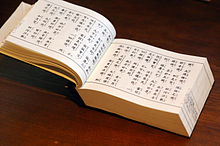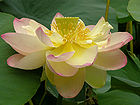- Amitabha Sutra
-
Lands India • China • Japan
Vietnam • Korea
Singapore • Taiwan
Tibet • Bhutan • Nepal
Mongolia • United StatesDoctrine Bodhisattva • Śīla
Samādhi • Prajñā
Śunyatā • TrikāyaMahāyāna Sūtras Prajñāpāramitā Sūtras
Lotus Sūtra
Nirvāṇa Sūtra
Saṃdhinirmocana Sūtra
Avataṃsaka Sūtra
Śūraṅgama SūtraMahāyāna Schools Mādhyamaka
Yogācāra
Esoteric Buddhism
Pure Land • Zen
Tiantai • NichirenThe Amitābha Sūtra (traditional Chinese: 阿彌陀經; pinyin: Āmítuó Jīng; Vietnamese: A di đà kinh; Japanese: Amida Kyō) is a popular colloquial name for the Shorter Sukhāvatīvyūha Sūtra. The Amitābha Sūtra is a Mahāyāna Buddhist text, and it is one of the primary sūtras recited and upheld in the Pure Land Buddhist schools.
Contents
History
The Amitābha Sūtra was translated from Sanskrit into Chinese by Tripiṭaka Master Kumārajīva in 402 CE, but may have existed in India as early as year 100 CE, composed in a Prakrit language.[1]
Content
The bulk of the Amitābha Sūtra, considerably shorter than other Pure Land sūtras, consists of a discourse which the Buddha gave at Jeta Grove in Śrāvastī to his disciple Śāriputra. The talk concerned the wondrous adornments that await the righteous in the western pure land of Sukhāvatī (Chinese: 西方極樂國), as well as the beings that reside there, including the buddha Amitābha. The text also describes what one must do to be reborn there.
In Buddhist traditions
In Pure Land and Chán Buddhism, the sūtra is often recited as part of the evening service (Chinese: 晚課; pinyin: wǎn kè), and is also recited as practice for practitioners. The Jōdoshū and Jōdo Shinshū schools also recite this sūtra when necessary. It is frequently recited at Chinese and Japanese Buddhist funeral services, in the hope that the merit generated by reciting the sūtra may be transmitted to the departed.
A common format for the recitation of the Amitābha Sūtra (in the Chinese tradition) may include some or all of the following:
- Praise for the Incense Offering (盧香讚)
- Praise to the Lotus Pond (蓮池讚)
- The Amitābha Sūtra (阿彌陀經)
- Pure Land Rebirth Dhāraṇī (往生咒).
- Amitābha Gāthā (彌陀偈)
- Recitation of Amitābha Buddha's Name (佛號)
- Transfer of Merit (迴向)
Mantras
In the Taishō Tripiṭaka, the Amitābha Sūtra is proceeded by the Pure Land Rebirth Dhāraṇī:
- namo amitābhāya tathāgatāya tadyathā
- amṛtabhave amṛtasaṃbhave
- amṛtavikrānte amṛtavikrāntagāmini
- gagana kīrtīchare svāhā
See also
- Infinite Life Sutra (Longer Pure Land Sutra)
- Contemplation of Amitabha Sutra
- Mahayana sutras
References
- ^ Hanh, Thich Nhat (2003). Finding our True Home: Living in the Pure Land Here And Now. Parallax Press. pp. 11 and 12. ISBN 1-888375-34-5.
External links
- The Shorter Sukhāvatīvyūha Sūtra. Lapis Lazuli Texts.
- The Smaller Sukhavativyuha Sutra, translated by Nishu Utsuki
- English translation of the Amitabha Sutra
- Chinese / English bilingual version of the Amitabha Sutra
Buddhism Categories:
Wikimedia Foundation. 2010.


